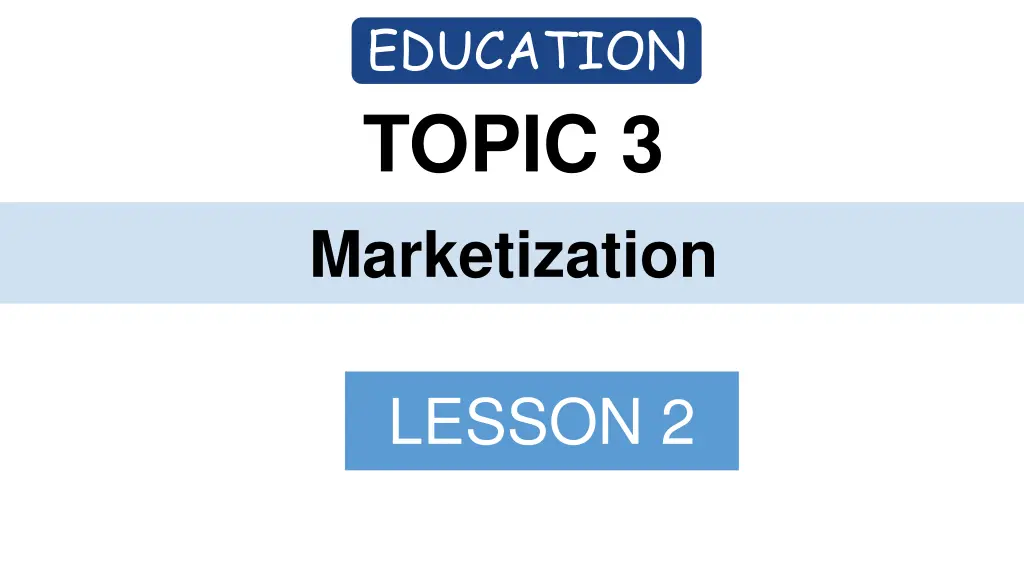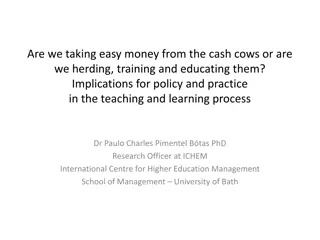
Understanding Marketization in Education
Explore the impact of marketization on education, including increased freedom and choice. Learn about policies promoting marketization, such as business sponsorship of schools and publication of league tables. Evaluate the effects of competition among schools and the implications for standards and quality in education.
Uploaded on | 3 Views
Download Presentation

Please find below an Image/Link to download the presentation.
The content on the website is provided AS IS for your information and personal use only. It may not be sold, licensed, or shared on other websites without obtaining consent from the author. If you encounter any issues during the download, it is possible that the publisher has removed the file from their server.
You are allowed to download the files provided on this website for personal or commercial use, subject to the condition that they are used lawfully. All files are the property of their respective owners.
The content on the website is provided AS IS for your information and personal use only. It may not be sold, licensed, or shared on other websites without obtaining consent from the author.
E N D
Presentation Transcript
EDUCATION TOPIC 3 Marketization LESSON 2
C/W Marketisation of education LEARNING OUTCOME: SOME: To evaluate the impact of marketization on education. MOST: to explain the increases in freedom and choice in education. ALL: To describe what is meant by marketization & link to education. DO NOW: What is marketisation? S&C: How can education be compared to a market?
DO NOW: What is marketisation? S&C: How can education be compared to a market? This refers to the process of introducing Market Forces into areas run by the state, such as the NHS or Education. conservative government Introduced by the The 1988 ERA (Education Reform Act) created an Education Market by: -Reducing direct state control over education -Increasing competition between school -Increasing Parental Choice of schools.
POLICIES TO PROMOTE MARKETISATION TASK: Compile a list of policies which have been introduced to increase COMPETITION between schools For example, Publications of league tables Business sponsorship of schools, Schools being able to opt out of LEA control, Schools having to compete to attract pupils, Ofsted inspection reports available for parents to look at when choosing schools.
S&C: To what extent is competition amongst schools a good thing? TASK: How do these policies promote marketization? WHAT IS IT? HOW DOES IT PROMOTE MARKETISATION Publication of school League Tables Business sponsorship of schools Schools being able to opt out of LEA control Ofsted inspection reports available for parents to look at when choosing schools
S&C: To what extent is competition amongst schools a good thing? Improved standards, quality, need for recruitment of students. Too much competing, too much focus on exams rather than well-being?
SUMMARY: Marketisation in education is The 1988 Education Act led to market forces being introduced in education e.g. consumer choice and competition > what do these mean? The focus on giving parents more choice over their children's schooling and funding based on student numbers have reflected these changes > what choices (about education) do your parents make? Consumer choice refers to the decisions that consumers make with regard to products and services. Competition the activity or condition of striving to gain or win something by defeating or establishing superiority over others.
DISCUSS: What factors would you take into account when picking a school for a younger sibling / cousin?
The National Curriculum and Testing The National Curriculum was introduced in 1989 in all state schools National tests (e.g. SATs and GCSEs) to measure students performance. Q: Can you think of any positives or negatives of testing children from the ages of 7 and up? S&C: Q: Who might find these performance measures useful and why? THINK Would you want your younger sibling/cousin to be tested at the age of 7?
REVIEW What is Parentocracy? M. David (1993) power shifts from the schools to the consumers (parents) Some would argue that marketisation produces INEQUALITY. Ball argues that marketisation creates parentocracy . Middle class parents are more advantaged as they have more economic & cultural capital, and are more able to take advantages of the choices available- e.g. move to better catchment areas.
PRACTICE EXAM QUESTIONS 1. Explain briefly the main aims/purposes of the Educational Reform Act (2 marks) 2.Briefly outline what is meant by Marketisation? (2 marks) 3.Outline and explain two policies which have been introduced to increase marketisation between schools (4 marks) S&C: What are the advantages and disadvantages of marketisation? Refer to the following key words: League tables class inequalities shifting funding formula power cream-skimming diversity silt- parents
H/W: Research Task You are a parent looking for a secondary school for your daughter. Research the following two schools in Barnet: St Michael s Catholic Grammar School- http://www.st- michaels.barnet.sch.uk/ Whitefield School- http://www.whitefield.barnet.sch.uk/ 1. Provide brief details on each school including: number of pupils, type of school, gender, Ofsted rating, aims/ mission statements. 2. Which school has better GCSE and A Level results? Provide two reasons why do you think this is? S&C: A. Using the data above, which school would you send your child to and why? (counter arguments!)
Is it possible to have an education system where the same choice is freely available to all students? What are your opinions, position yourself somewhere along the line. YES NO







